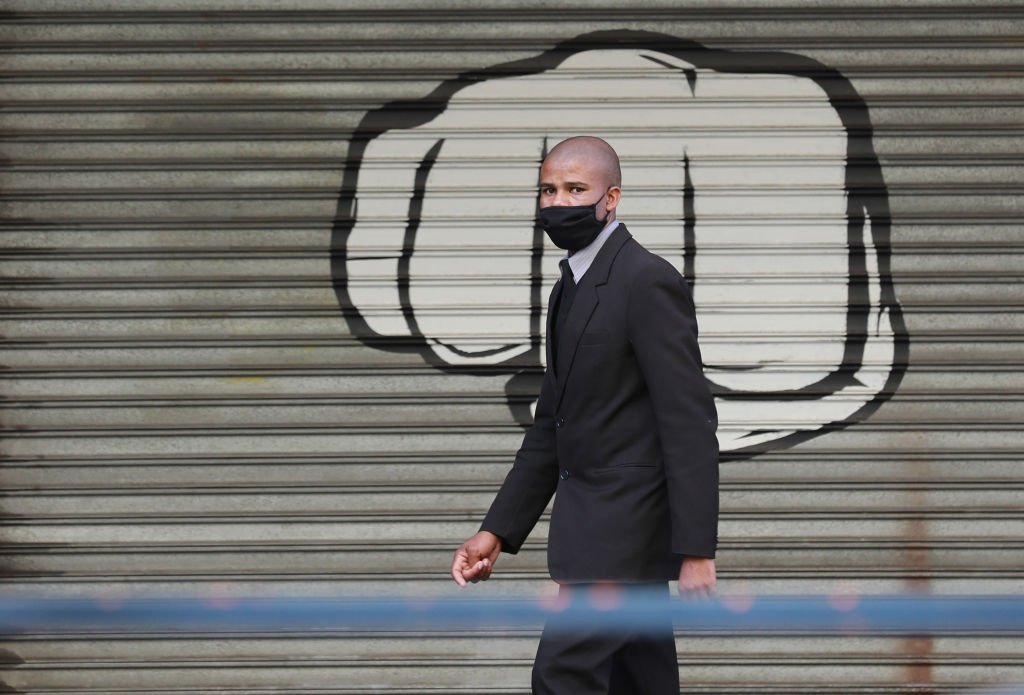- More than four in 10 News24 readers’ personal finances “severely affected” by Covid-19.
- 60% of readers have dipped into their savings funds.
- 35% say their salary or wage has been reduced since the outbreak of the pandemic.
A new Ipsos/News24 poll has revealed the dire effects of the Covid-19 pandemic on many News24 readers’ finances, with thousands resorting to dipping into their savings to make ends meet and reporting a severe impact on their financial positions.
The online survey covered 52 287 readers from across the country and was conducted from 25 May to 4 June.
More than four in 10 News24 readers said their finances had been severely affected by the Covid-19 pandemic, answering nine or 10 out of 10, on a scale of one to 10, when asked to indicate the severity of the Covid-19 influence on their personal finances.
News24 and Ipsos conducted the survey in an attempt to understand the impact of the pandemic on readers’ personal finances, but also sought readers’ views on a number of issues related to Covid-19.
The findings of the poll were weighted and projected to account for demographics and internet connectivity.
Mari Harris, political analyst at Ipsos South Africa, explained:
“The findings are representative of South African adults with access to the internet – whether this access is at home, at work and/or on a mobile phone. This group represents about two-thirds of all adults in the country and covers all provinces, population groups, ages and people of different working status and incomes.
“However, it will be fair to describe this online group as more ‘connected’ than those South Africans who have no access to the internet.”
Other findings in the survey include:
- Most News24 readers surveyed approve of the government and Cyril Ramaphosa’s response to the pandemic.
- Just over half of News24 readers feel that public health is more important than the economy when asked to choose between the two.
- Just over half of News24 readers want the economy to be reopened, even if the virus is not contained.
- About four in 10 News24 readers do not think the government is assisting the poor.
- About 68% of News24 readers will vaccinate themselves and their dependents if a Covid-19 vaccine becomes available.
- Readers are divided on whether the tobacco and alcohol bans (still in force at the time of the survey) should be lifted.
The findings suggest that the pandemic has taken a toll on the personal finances of readers, with just 5% of readers saying their finances had not been severely impacted at all.
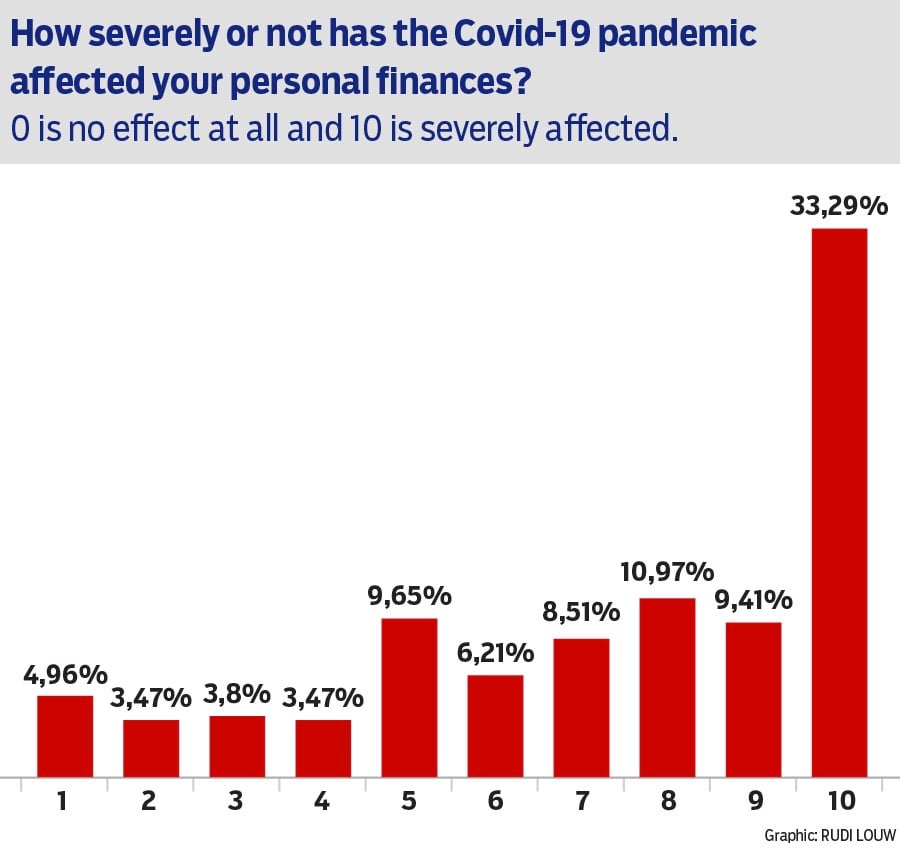
The survey’s results come as Finance Minister Tito Mboweni is set to deliver a supplementary budget on Wednesday, with a yawning debt-to-GDP ratio expected to be announced.
In an increasingly confined fiscal space, Mboweni is expected to explain how he plans to reprioritise R130 billion from the existing budget, as mandated by President Cyril Ramaphosa in April. The money forms part of a R500 billion economic rescue package announced by the president.
On Tuesday, Statistics South Africa revealed that the country’s official unemployment rate had breached the 30% mark – and, at 30.1%, was the highest it has been in a decade, Fin24 reported.
National Treasury reportedly expects between 690 000 and 1.8 million job losses this year, while the economy is expected to contract by up to as much as 10%.
The News24/Ipsos survey also revealed that:
- Six in every 10 (60%) people said they had already used money from their savings or emergency funds to cover their expenses, following the outbreak of the pandemic and the imposition of a hard lockdown;
- Six in 10 people said they were worried that the impact of the Covid-19 pandemic will seriously damage their retirement savings and retirement plans; and
- Just over six in 10 said they were worried about meeting their monthly debt and loan payments.
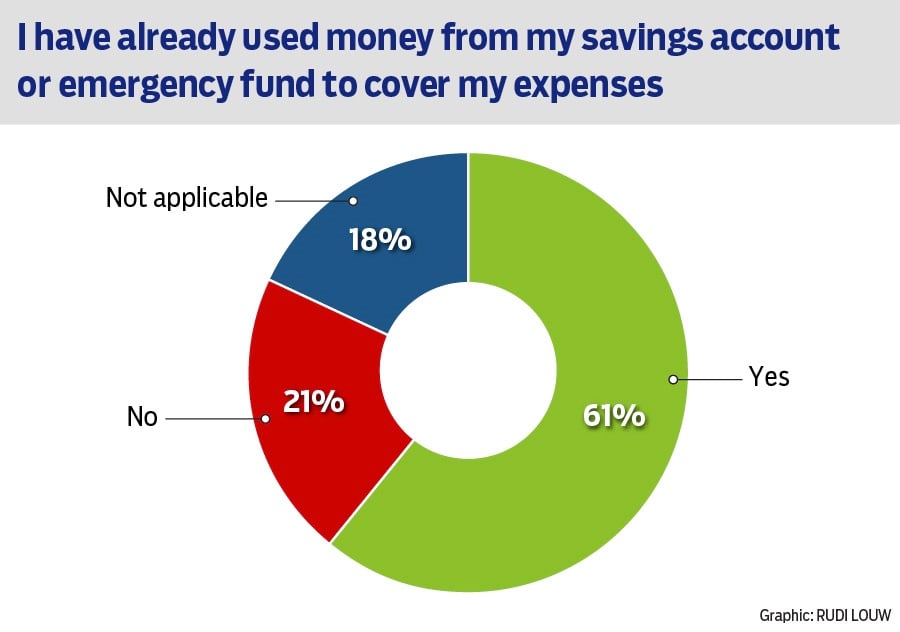
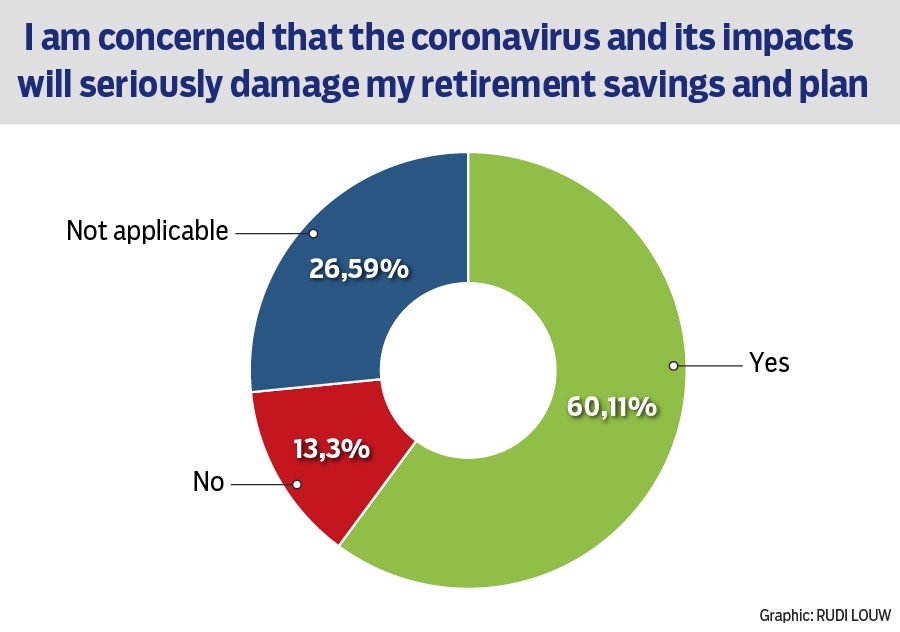
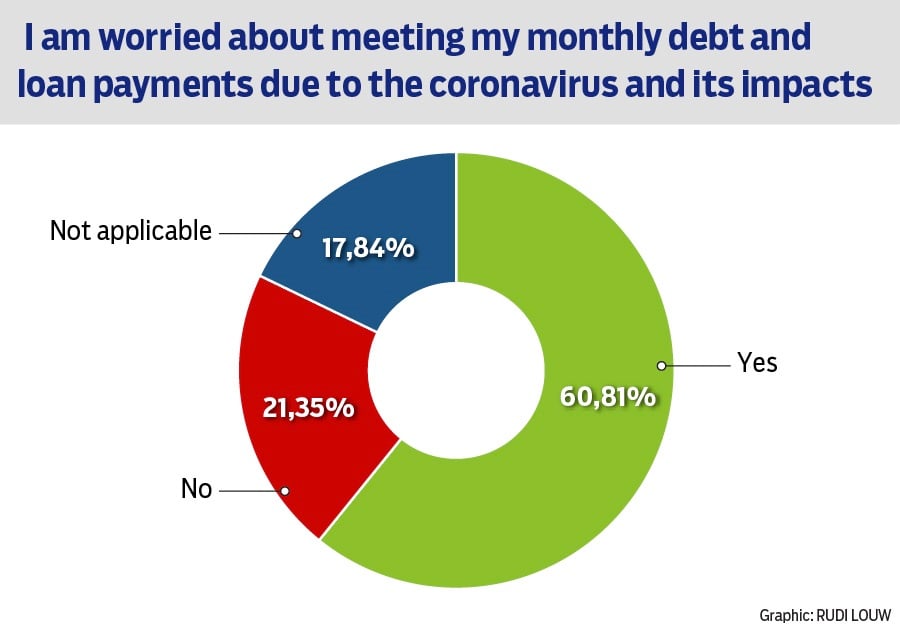
Skewed along racial lines
The financial impact of the pandemic on News24 readers showed a racial skewing, with black people seemingly more affected.
About 46% of black respondents said their finances had been severely impacted by Covid-19, or 9-10 on a scale of 1–10. On the other hand, about 35% of white people said the same thing.
Of the 73% of black respondents, who were earning an income before the pandemic, 16% lost their job, versus 11% of the 80% of white respondents previously earning an income.
More white respondents were concerned about the impact of the virus on their savings or retirement plans than black people.
Iraj Abedian, chief executive of Pan African Investment and Research Services, says that because South Africa’s economy is largely still skewed along racial lines, this is to be expected.
Abedian said:
This is a worldwide phenomenon. Those who have wealth worry about their savings and those who live hand to mouth have more immediate concerns. Whether it is a health or a financial crisis, the wealthy quickly worry about their savings, while the working class worry about the immediacy of losing their income.
Black people being more severely affected by the pandemic than white people, financially, is another by-product of the racially-skewed economy, said Abedian.
“White people have inherited wealth, and other investments, and have a much better wealth base to weather the storm. Whereas the black majority, even those who are middle class, who have built up savings over the last 20 or so years, stand to lose everything.”
He said that the middle class, as well as the more financially better off black population, are “very, very vulnerable to impoverishment”.
For example, he said that some investment portfolios have lost up to 40% since the pandemic hit South Africa.
“If you have built up a retirement fund of R1 million, that is a phenomenal loss if you are close to retirement,” he said.
“Lower and middle-income people face the very real prospect of sudden impoverishment,” he said.
Job losses
Of the 76% of participants who said they earned an income before the pandemic, many had lost part of their income, their job, or were forced to take unpaid leave.
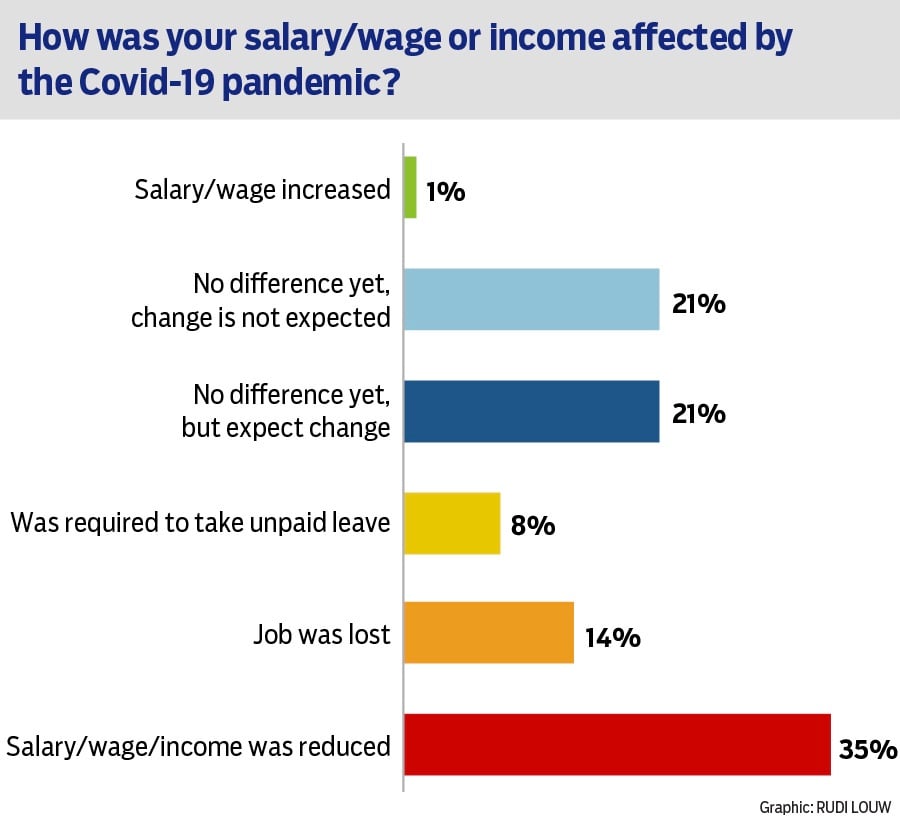
Harris said that the 14% who had lost their jobs would amount to about three million South Africans.
She said it was, therefore, “not surprising” that 55% of News24 readers thought the economy should be reopened, even if the virus was not fully contained.
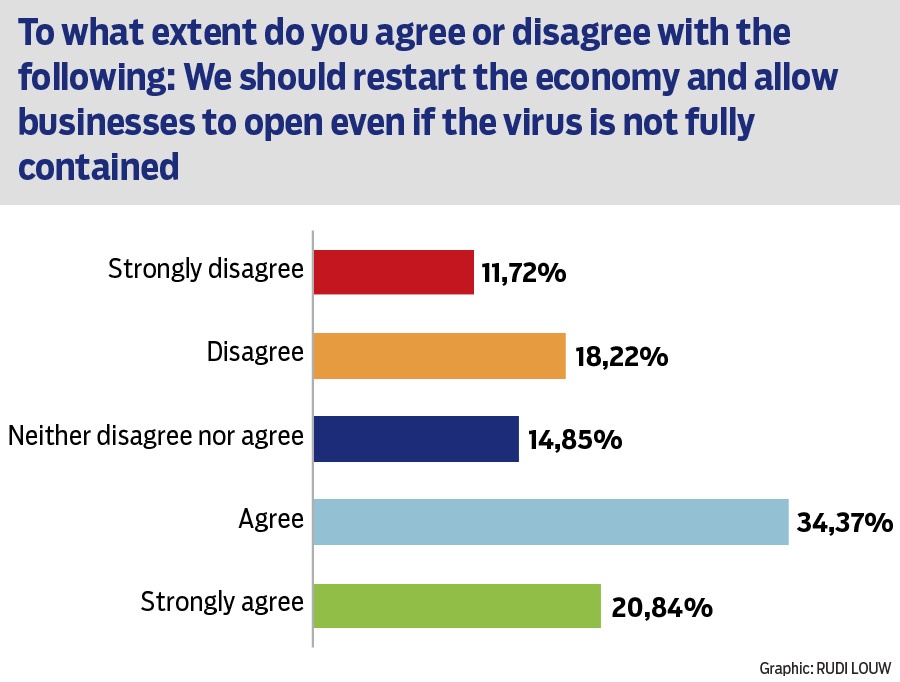
However, about two-thirds also said they would be nervous to leave their homes if businesses were allowed to reopen and travel allowed to resume.
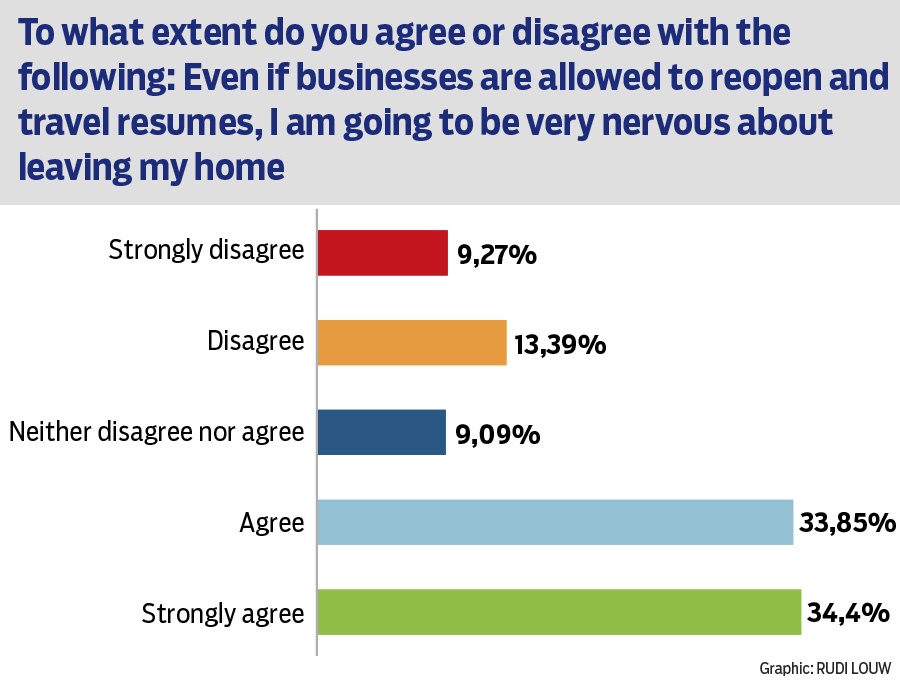
Over half agreed or strongly agreed that public health was more important than the economy, while 31% agreed or strongly agreed that the economy was more important.
The rest opted not to make a choice.




